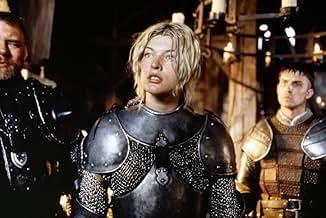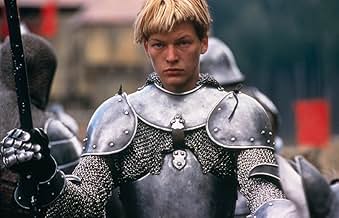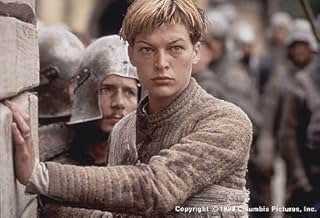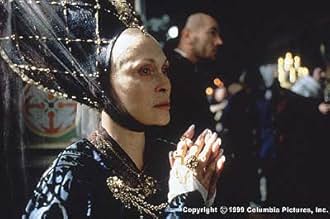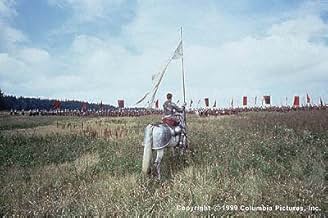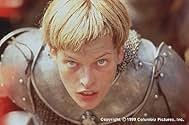Une jeune fille a une vision qui la pousse à bouter les forces occupantes hors de France.Une jeune fille a une vision qui la pousse à bouter les forces occupantes hors de France.Une jeune fille a une vision qui la pousse à bouter les forces occupantes hors de France.
- Réalisation
- Scénario
- Casting principal
- Récompenses
- 5 victoires et 13 nominations au total
- Look Out
- (as Stephane Algoud)
Avis à la une
The picture that Luc Besson made here deserves to be appreciated on its own merits. It is visually stunning, rousingly action-packed, and full of interesting period details. Yes, casting his supermodel wife Milla Jovovich in the lead was a risky choice, as her looks were hardly those of a typical medieval peasant. Yes, her performance did not resonate with the period the way one by a more classically trained actress might, although she was clearly never trying to be Ingrid Bergman. Still, Milla's hyperactive personality made her interesting and watchable as a historical person about whom so much has been written, who nonetheless existed so far back in the past that she lacks a strongly identifiable humanity. When somebody makes a better statue than a person, as Joan does from a contemporary viewpoint, odd casting choices can be forgiven if they work. Milla's twisty mannerisms, rolling eyes and whispery speech give the viewer constant occasions to ponder just how much of Joan's fanaticism came from genuine devotion to God and the church and how much was just an under-medicated personality disorder. This is actually one of the key scholarly issues surrounding Joan's life, and the picture brings it to the fore in its latter part as Joan herself tries to come to terms with her own claims of divine communication by means of a debate with Dustin Hoffman as her confessor-priest/conscience. That Besson takes no particular viewpoint here is an interesting choice, and one which actually helps the viewer to understand why Joan's story has compelled so many generations of historians.
The political aspects of Joan's life and legend were also dealt with in a nicely balanced fashion. Like many figures in times when political and national alliances changed with the seasons, Joan herself blew back and forth between being tremendously useful to the French throne at times and dangerously inconvenient at others. Fame is a powerful commodity at any time, and the picture carefully tracked the rise and fall of Joan's fortunes as she watched hers be manipulated, leveraged and ultimately put on trial.
I thought a lot of The Messenger and recommend it. Religious and historical scholars are advised to approach with caution.
So I popped this flick in the DVD player not expecting much. Sacrée merde! What a surprise. It seems, stripped of her futuristic-mutant-motorcycle-riding-vampire persona, she's really quite good. This film--probably the least glamorous of her entire repertoire--really gives her a chance to show her full dynamics. I can't say much more without giving away the plot, so I'll drop it for now.
Now on to the director Luc Besson. For the first half hour or so, he seems to suffer from "I wanna be Kenneth Branagh" syndrome (which is almost as painful as the avian flu). We get a dozen scenes of someone running down a corridor with the camera chasing behind. We get a dozen overhead-camera-twirly shots of someone lying on the ground. We get so many crane shots, you start thinking you're on a construction site. What's wrong with all this? I'll tell you. When the camera swings & sways too much it detracts from the actors' performances. Sure it adds visual drama, but so can a good fireworks scene (with just as much subtlety).
But suddenly, right around the halfway mark, the camera man simmers down. The whole tone of the film changes, becomes darker and more intense, relying on the power of the actors instead of the gimmicky camera-work. This works brilliantly, especially when Dustin Hoffman finally steps in.
This is the break that takes the movie in an entirely different (and possibly offensive) direction. It looks like some IMDb reviewers weren't too happy. I'm sure plenty of others got bored (because the swordfights stop). But me, I thought this change of mood was what made the movie. Suddenly it becomes a spooky, psychological thriller with a lot of great dialogue and a ton of good acting. THIS is the payoff.
My biggest gripe with the movie is that after seeing the 2nd half, I kept saying to myself "why the hell did Besson waste so much time getting here?" There were a few too many insignificant fluff scenes in the beginning (like the virginity test lol) that should have been replaced with more of the powerful Milla-Dustin dialogue toward the end.
I won't comment on historical accuracy, religious sacrilege, lack-of-realism or the fact that there were a few too many American accents for 15th century France. These flaws fall by the wayside if you're instead paying attention to the complex conflict brewing in Milla's character. This is really her movie, and a damn good one at that. Like my title implies, it's good enough to make me want to give Ultraviolet another try.
Well that's what you would think all Besson's film amounts too, given the hate and general negativity that pours down on it from many of the worlds cinematic sources. Well, look, it's not brilliant, but is it really the devil that many have painted it as? Not so say I. It's about as subtle as a sledgehammer all told, but Besson's study of the iconic/infamous waif who did indeed expel the British hoards has gusto by the shed load. He nicely crafts the 15th century lands from which to tell his story, and then, to quote someone from another period epic, unleashes hell. Literally. Yep the British armies are stereotypically vile {I bet Mel Gibson loves the Brit portrayals here}, and the blood that is shed is vicious and borderline sick. But it works well in the context of Jeanne's prominent rise and subsequent fall, with her religious confliction deftly blending in with the blood being shed in the pursuit of liberation. Visually the film is a treat, and for action construction it holds up to be one of the better modern day historical epics in that department. But where's the substance?
Ah, there's the big problem with the movie. Besson and his co-writer Andrew Birkin are so pre-occupied with the horrors of war and Jeanne's leadership qualities, they turn the rest of the film into a skeleton in need of flesh. And it's actually Jovovich who suffers the most. She's great when she's screaming and launching into the enemy, taking an arrow hit with grace and dedication . But there's been no character depth laid out, so Jovovich's Jeanne just comes across as a moody teenager out to cause trouble. We need to have some insight into her troubled predicament and what drives her on, not the scantily written filler moments that actually are just appetisers to blood letting battles. There 's also annoyances when the film slips into moments of modern day speak, it's a crass and lazy oversight by the makers to think that we wouldn't notice such speak in 15th Century France. Besson surrounds Jovovich with some fine acting talent tho, even if some are a tad underused. Rolling out are John Malkovich, Dustin Hoffman, Faye Dunaway, Vincent Cassel, Timothy West, Desmond Harrington and the always watchable, and scary, Tcheky Karyo.
So a bit hollow it be, but on the outside it's a ripper. Visceral, explosive and yes, fun too. 7/10
Jovavich's Jeanne is plagued by the difference between her idea of utter submission to God and the consequences of doing so; by doubt over the veracity of her visions; and by the gap between her ideals of the divine rights of kings and realpolitik. She is constantly on the verge of a nervous breakdown - is this a manifestation of her mental illness, or of her "burning for God"? And where's the difference between the two?
The film raises more questions than it answers, and that's as it should be. It is something of a shame that Besson's film takes liberties with the facts as we understand them (though history is more often about our interpretation of events than the events themselves), but in terms of raising important questions on the nature of faith, it succeeds beyond measure.
I have to admit to putting myself in Jeanne's place, feeling what she must have been feeling along the way. I think without that, it probably would have been a much duller movie, although probably entertaining.
The battles scenes, of which there were many, were graphic and brutal. Dismemberments, swords and maces swinging, lots of pain and death. The ensuing desolation at the end of a battle were weighty and gave a a horrible look at the conditions of the time.
My final impressions... Joan of Arc, if the portrayals were accurate was a driven young woman, deeply religious and deeply confused who was probably at least partially insane. If she were alive today, no doubt, she would be treated with common drugs and would lead a normal life. I felt very sorry for her and her situation and for the way that she was treated. I know people would argue that there is no need to feel this way, because she was clear and sure of her purpose. I don't feel that this was ever the case and she was sure only that she was going crazy if she didn't do something.
Movies don't usually move me this way and I'm really amazed.
Le saviez-vous
- AnecdotesMost of the characters, including Joan's Captains, were real people. Giles de Rais was a real person who, after the war and Joan's death, retired to his lands. Many years later, he was arrested for the murder of more than 100 young boys, and executed. Some historians believe that his crimes were the basis for the French fairy tale "Bluebeard," about a rich man who murders his wives and hides their bodies in his grand house.
- GaffesJoan's older sister was not murdered by soldiers, but survived to adulthood and married. She died ultimately in childbirth.
- Citations
Joan of Arc: I've always been faithful to God and I've followed everything He's ever said and I've done everything He's ever asked me to do.
The Conscience: God asked you to do something?
Joan of Arc: Yes. Yes, lots of things.
The Conscience: You mean God said, "I need you, Jeanne."
Joan of Arc: No. But He sent me signs.
The Conscience: Signs? What signs?
Joan of Arc: The wind. The wind. And the clouds, ringing!
The Conscience: Ringing clouds?
Joan of Arc: The dance. The dance. The dance. The dance.
The Conscience: The dance.
Joan of Arc: The sword! The sword lying in the field. That was a sign.
The Conscience: No. That was a sword in a field.
Joan of Arc: No. No, that was a sign!
The Conscience: No. That was a sword. In a field.
Joan of Arc: It can't just get there by itself! It can't. A sword just doesn't get there by itself. It can't just get there by itself.
The Conscience: True. Every event has an infinite number of causes, so why pick one rather than another? There are many ways a sword might find itself in a field.
- Versions alternativesThe European release was 10 minutes longer than the US theatrical version, which omits, among others, the scene where Joan's virginity is tested before the court of King Charles VII. The longer version has been released in the USA on DVD.
- Bandes originalesMy Heart Calling
Lyrics and Music by Éric Serra and Achinoam Nini
Produced by Éric Serra
Performed by Achinoam Nini
With the Special Authorization of Interscope/Geffen
Meilleurs choix
- How long is The Messenger: The Story of Joan of Arc?Alimenté par Alexa
Détails
- Date de sortie
- Pays d’origine
- Langues
- Aussi connu sous le nom de
- Juana de Arco
- Lieux de tournage
- Bruntal, République tchèque(Fort of the Tourelles)
- Sociétés de production
- Voir plus de crédits d'entreprise sur IMDbPro
Box-office
- Budget
- 85 000 000 $US (estimé)
- Montant brut aux États-Unis et au Canada
- 14 276 317 $US
- Week-end de sortie aux États-Unis et au Canada
- 6 360 968 $US
- 14 nov. 1999
- Montant brut mondial
- 66 976 317 $US
- Durée2 heures 38 minutes
- Couleur
- Mixage
- Rapport de forme
- 2.39 : 1
Contribuer à cette page




